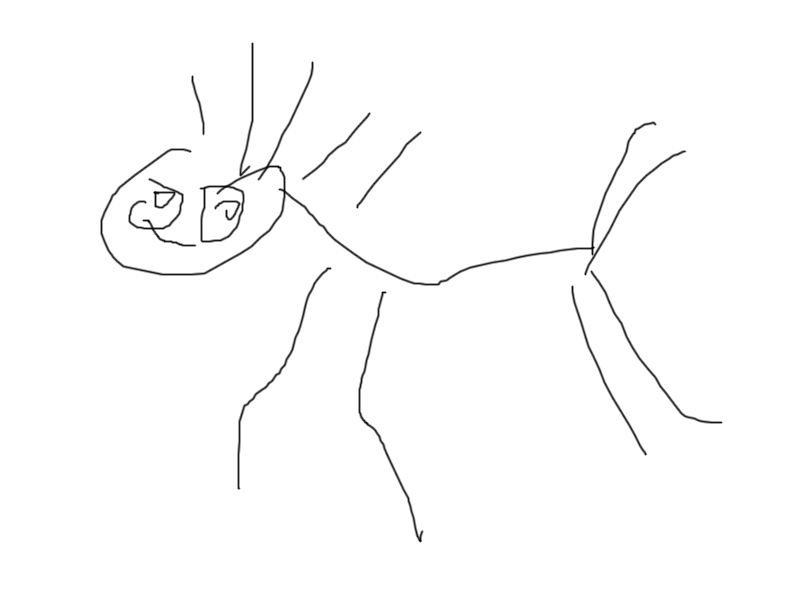Suppose you’d never seen a horse in real life, or a photograph of one. Pretend, just for a moment, that the only thing you’d ever seen someone refer to as a horse, was a picture like this:
Looks pretty stupid, right?
Now, how would you feel if you had a number of encounters with people who would talk about how majestic horses were.
You’d think these people were idiots, right?
Of course, in this hypothetical scenario, nobody has a photograph of any of these mysterious creatures. There’s no real evidence that they exist, as far as you can tell.
Sometimes, just to be sure, you’ll draw a picture, just to be sure. You’ll do your best to make it really stupid and say, you think this is majestic? Just to be sure. And still, a lot of people will indignantly put their hands on their hips and say, yes, that is a horse, and yes, they are majestic, but you just don’t see to get it, do you?
What reason do you have for thinking these people are anything other than stupid?
Try answering the question without drawing on your knowledge that horses really are a real thing, and that they (sometimes) look more like this:
Horses are obviously an extreme example that doesn’t work, because you know they are real. Nobody’s passing around stick drawings of horses like the above and calling them majestic; if someone did, you’d know the real thing they are referring to, rather than just the line drawing.
I think something like this dynamic plays out all the time. I call it memetic inoculation.
Being exposed to a weakened version of a real virus can help your body become immune to that virus. Likewise, being exposed to a simpler copy of a complex idea can cause you to be come ‘immune’ to the complex idea. Whenever you encounter its stupid cousin again, your immunity grows. And if you happened to encounter the real idea in the wild, you’ll likely lose your only real chance to understand it, because your memetic immune system will convince you that a potentially useful conversation is a waste of time.
Memetic Inoculation
Put these in the ol’ meat computer and let ‘em reproduce a while:
-
complicated ideas take more energy to transmit than simple ones
-
for every complex idea (e.g. the real horse) there are a large number of stupid copies (e.g. the terrible line drawing)
-
accurate beliefs help a person navigate reality more effectively, and thus generally promote a more positive emotional valence, making them at least somewhat viral
-
people can often understand things without being able to articulate them, so when a person is helped by a complex meme, they will often reproduce and transmit a simpler variant of the original complex meme
-
for some people, even ludicrously simple copies of complex ideas actually work, triggering a similar level of emotion resonance and thus utility
-
thus all beliefs, if they are remotely subtle or complicated, should be expected to be outcompeted in the marketplace of ideas by their own stupid cousins
-
intelligent people tend to rely on the helpful heuristic “I’ve seen this idea before” in order to avoid wasting their time with cranks
-
people get defensive when an idea they identify with is dismissed out of hand, so in response to having their stick horse dismissed as nonsense, many people will defend the stupid copies of subtle ideas and many will even reject the more complex form
The end result here is that you may be inoculated against many valid, helpful, accurate ideas, because you’ve been exposed to their stupid cousins first. There are many examples of these, but writing them here would be like offering my readers a USB stick full of info hazard, which I’d prefer not to do.
If you’ve got beliefs that you know any sane person would accept as valid, if they would just open their minds a bit, perhaps you’re encountering people who are inoculated against your beliefs. Have you ever seen the stupid cousins of your own treasured beliefs? I’m finding that first articulating the stupid idea and agreeing that yes, it’s stupid, can help some listeners take me a bit more seriously.
The world is full of truly beautiful ideas. Some are waiting patiently for us to discover them. Others are already out, gallivanting around in the wild, surrounded by millions of their cartoony cousins, because the same meme can be both r and k selected at the same time.
And isn’t that majestic?

from Hacker News https://ift.tt/9TPfe3s

No comments:
Post a Comment
Note: Only a member of this blog may post a comment.